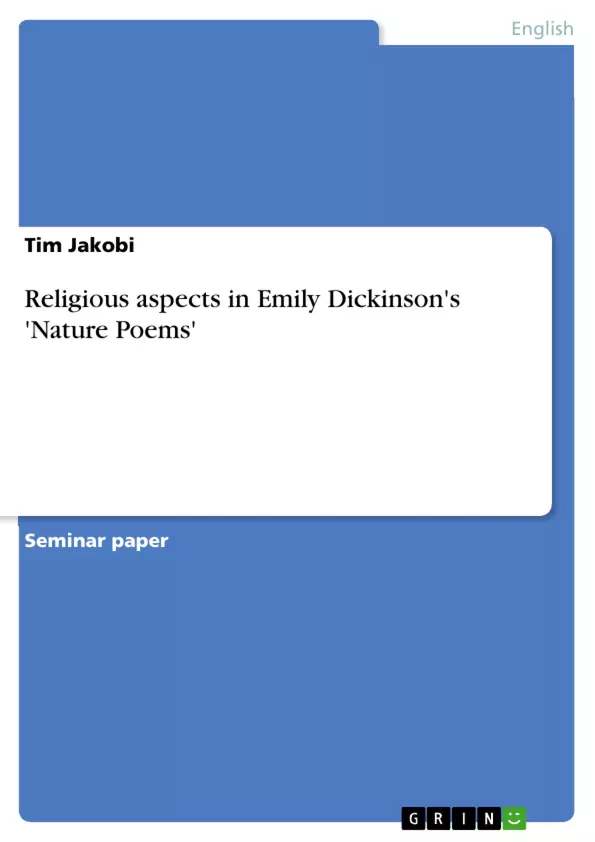Table of Content:
1. Introduction
2. Religious Background to Dickinson’s Poetry
3. Nature and Religion in Emily Dickinson’s Poems
3.1. A Mystical View – The Divine in Nature
3.2. Turning Around – A Sacramental View on Nature
3.3. Towards a Pessimistic View on Nature
4. Concluding Remarks
5. References
1. Introduction:
Emily Dickinson is without doubt one of America’s most interesting and fascinating authors, especially with regard to her quite extravagant vita, living secluded from the public for the majority of her life and not even leaving her house. Confining herself exclusively to poetry, she has created poems of marvellous emotional impact and this especially holds true for her poetry dealing with nature. As there is hardly any poem on nature by her that does not have allusions to or is combined with religious themes, it makes this branch of her work even more interesting to deal with. But to be able to grasp all the allusions Dickinson has made to religion in various ways, her Calvinist-based church and the like, it is necessary to have an insight into her religious life, which is why a brief outline of her religious vita stands at the beginning of this paper.
There are many writings which deal with Dickinson’s faith and the religious topics in her work – among them those used as references in this paper like the works by Doyle, Klein and Knapp, for instance. Jane Donahue Eberwein, a well-respected Dickinson specialist, puts a lot of emphasis on Dickinson’s poetry with regard to the poet’s Calvinist heritage in her writings, all of which are worth reading.
One can find references to religion in more than only Dickinson’s nature poems, for example her poems on the life of Christ, but I will exclusively deal with her poems on nature, primarily focusing on “her quest for knowledge of the divine” , as Grimes puts it, and how this is reflected in her poetry. A few poems shall be exemplary for this and will be commented on. However, each of them will not be analyzed in too much detail. First and foremost, the main goal is to give an overview on how Dickinson refers to the deity through her poetry and how this view on the divine and (parallely) on nature changes over the course of her life.
Table of Contents
- Introduction
- Religious Background to Dickinson's Poetry
- Nature and Religion in Emily Dickinson's Poems:
- A Mystical View – The Divine in Nature
- Turning Around - A Sacramental View on Nature
- Towards a Pessimistic View on Nature
- Concluding Remarks
Objectives and Key Themes
This paper aims to explore the religious aspects present in Emily Dickinson's nature poetry, examining how her religious background and personal journey influenced her poetic representation of nature. It delves into the intricate relationship between nature and the divine, showcasing Dickinson's evolving perspective on both.
- Emily Dickinson's religious background and its influence on her poetry
- The interplay between nature and the divine in Dickinson's work
- The evolving perception of nature in Dickinson's poetry
- The significance of Dickinson's non-membership in the Congregationalist church
- The concept of 'sacramental view' and its presence in Dickinson's poems
Chapter Summaries
- Introduction: This chapter introduces Emily Dickinson as a significant American author known for her secluded life and emotionally evocative poetry, particularly those focusing on nature and its intertwining religious themes.
- Religious Background to Dickinson's Poetry: This chapter explores Dickinson's religious background, rooted in Connecticut Valley Congregationalism, which is influenced by Calvinism and Puritan theology. The chapter highlights Dickinson's unique stance on the sacraments and her gradual distancing from her family's strict religious beliefs.
- Nature and Religion in Emily Dickinson's Poems: This chapter delves into the core theme of the paper, exploring the various stages in Dickinson's poetic representation of nature: from a mystical view of the divine in nature to a more sacramental perspective and ultimately towards a more skeptical and even pessimistic view.
Keywords
Emily Dickinson, American Nature Poetry, Calvinism, Connecticut Valley Congregationalism, sacraments, divine, nature mysticism, sacramental view, pessimistic view, religious themes, poetry analysis, religious background.
- Citation du texte
- Tim Jakobi (Auteur), 2004, Religious aspects in Emily Dickinson's 'Nature Poems', Munich, GRIN Verlag, https://www.grin.com/document/84786



